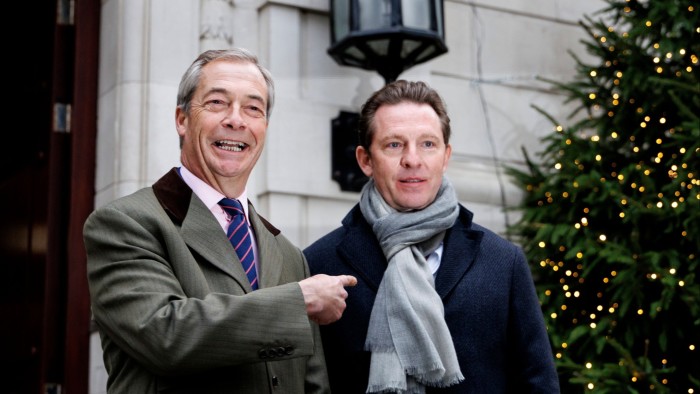This article is an on-site version of our Inside Politics newsletter. Subscribers can sign up here to get the newsletter delivered every weekday. If you’re not a subscriber, you can still receive the newsletter free for 30 days
Good morning. A frequent reader question recently has been: what do I think of the fact the betting markets make Nigel Farage the favourite to be Britain’s next prime minister? Some thoughts on that below.
Inside Politics is edited by Georgina Quach. Read the previous edition of the newsletter here. Please send gossip, thoughts and feedback to insidepolitics@ft.com
Odds and ends
The short answer is: not much, frankly. The next general election is at least four years away. It will probably take place after the end of Donald Trump’s second term. Xi Jinping will be 75 years old. The war in Ukraine could have stopped and started again. Essentially, there are so many things I know I don’t know about the world in 2028-29 that all I know for certain is that it would not be a good idea to make firm predictions about the terrain that the next UK election will be fought on.
I think in the here and now, the really important things remain — and I know, I’m a stuck record on this — whether the extra money raised, coupled with the right administrative decisions, can, at least demonstrate significant enough improvements in the NHS and policing, whether Labour’s suboptimal choices of tax rises will mean we all feel poorer, and whether some external shock hits the country or not.
Labour’s poll position at the moment only really tells us that a government that has raised taxes, increased spending and pivoted from promising us all “change” to sucking its teeth and going “you’ve had some right cowboys in here, it’s gonna cost ya” is not currently popular. No kidding.
What the bookies’ odds tell us at the moment is that punters are reacting to several things. First, that the populist right is currently the “in” movement — the US has one in office, France might have one in office, you get the picture. That’s the new part of the narrative and I am not going to make sweeping conclusions about that any time soon.
But there is an older story, which is that the bookies, like the polls and indeed the local elections going on around the country, tell us two things. The new government is not popular in part because it is taking unpopular decisions that may or may not pay off. But the main opposition party is not yet convincing people it is a worthy receptacle of people’s discontent.
We’ve seen that movie a lot in British politics, and it usually ends in the government being re-elected. Local and off-year elections might see victories for the Liberal Democrats, for Ukip, for George Galloway, and on one occasion for a man dressed as a monkey. Nigel Farage — who has considerably fewer seats than Ed Davey’s Liberal Democrats and unlike the Lib Dems has absolutely no proven pedigree of being able to win and hold council seats — might be a politician about to break the mould and to follow in the footsteps of his international co-religionists. But this might just be the same old story in British politics, with the familiar ending of a government being re-elected to a second term.
Now try this
I had a wonderful time seeing Vampire Weekend last night. I took a while to warm up to their new record but I now think it is their strongest yet. You can listen to it here.
Top stories today
-
Whitehall cuts | More than 10,000 UK civil service jobs are set to be cut under ministers’ plans to find savings of 5 per cent to their departments in the spending review, according to government figures.
-
I only want to be with EU | Keir Starmer will accept an invitation today to hold talks on defence co-operation with the EU, in the first such meeting between a British prime minister and the bloc’s 27 leaders since Brexit.
-
Planning scheme stuck in mud? | Measures designed to smooth the UK government’s new planning rules by giving local councils time to adapt to higher housing targets risk delaying their impact for years, experts say.
-
Losing appetite | Business leaders have warned chancellor Rachel Reeves at a private meeting that the economic environment is “extremely challenging”, with companies facing significant uncertainty owing to her tax-raising Budget and the government’s planned employment reforms.



